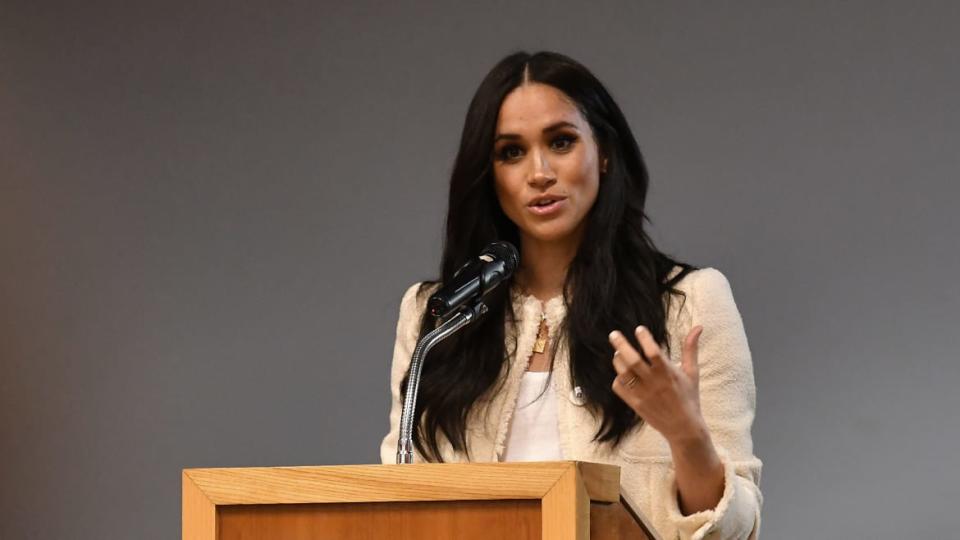Meghan Markle Claims Newspaper’s Publication of Letter to Her Father Was ‘Assault’

Meghan Markle suffered an “assault” on her private and family life when the Mail on Sunday published a letter she had written to her father, her legal team argued Tuesday.
Meghan’s lawyers said that she had put herself in “an unguarded and potentially vulnerable position” by writing to her father, and never intended the letter to be made public.
The Duchess of Sussex also doubled down on claims that she did not co-operate with Finding Freedom author Omid Scobie. Scobie “confirmed in his witness statement that neither he nor his co-author met with or interviewed the claimant or her husband for the book,” the legal argument submitted to the court by Meghan’s side says.
Meghan is seeking a “summary judgment” in her high-profile privacy and copyright action against Associated Newspapers Limited (ANL), triggered by the 2019 publication in the Mail on Sunday of a letter she sent the previous year to her estranged father, Thomas Markle.
If successful, a summary judgment in Meghan’s favor would end the case without a full trial, obviating the need for Meghan to either abandon the case or undergo a grueling and potentially embarrassing cross-examination in a London witness box.
The arguments are being presented in written form and via a remote hearing Tuesday and Wednesday.
Meghan is seeking aggravated damages, saying the publication of the letter was a misuse of private information and breached her copyright.
However, the paper argues that it was justified in publishing parts of the letter in response to interviews her anonymous friends had given to the U.S. magazine People in which they mentioned the letter but misrepresented its contents. They argue that Thomas Markle was entitled to correct the claims made about the letter.
ANL also claims that they believe Meghan wrote the letter “with a view to it being disclosed publicly at some future point” and that she was “at least in some measure prepared for the information to be disclosed.”
However, Meghan’s team described as “utterly fanciful” claims that Meghan did not see the letter as completely private.
ANL also argued that the letter had an unusual status as it was written with the assistance of a senior Kensington Palace press officer.
Antony White, QC for ANL, argued, “No truly private letter from daughter to father would require any input from the Kensington Palace communications team.”
White argued there is “a real prospect that the claimant will fail to establish either that she was the sole author in the copyright sense” as a result of the involvement of Jason Knauf, formerly communications secretary to the Duke and Duchess of Sussex, in writing the letter.
However Meghan’s team argues that she is the sole author of the letter, saying she spent many hours composing the letter on her iPhone and merely shared a draft of it “with her husband and Mr. Knauf for support, as this was a deeply painful process that they had lived through with her, and because Mr. Knauf was responsible for keeping the senior members of the royal household apprised of any public-facing issues—the media spectacle surrounding Mr. Markle being one such issue. Mr. Knauf provided comments on the Electronic Draft in the form of ‘general ideas’ as opposed to actual wording.”
The full trial of the duchess’ claim was due to be heard at the High Court this month, but last year the case was adjourned until autumn 2021 for a “confidential” reason.
Justin Rushbrooke QC, also representing the duchess, described the hand-written letter as “a heartfelt plea from an anguished daughter to her father,” which Meghan sent to Markle “at his home in Mexico via a trusted contact... to reduce the risk of interception.”
He said the “contents and character of the letter were intrinsically private, personal and sensitive in nature” and Meghan therefore “had a reasonable expectation of privacy in respect of the contents of the letter.”
Rushbrooke added in written submissions, “It is as good an example as one could find of a letter that any person of ordinary sensibilities would not want to be disclosed to third parties, let alone in a mass-media publication, in a sensational context and to serve the commercial purposes of the newspaper.”
He said the decision to publish the letter was an assault on “her private life, her family life, and her correspondence,” in documents submitted before the hearing.
Their argument submitted to the court stated, “Every citizen, whatever their profile or position, has the right under English law to respect for their private and family life, their home, and their correspondence.
“The defendant’s decision to publish, without the claimant’s consent or even prior knowledge, very substantial extracts from her letter to her father to its millions of readers worldwide was a plain and serious invasion of her rights of privacy in that letter.
“It was in fact a direct assault on, not just one, but three of the four strands of privacy rights protected under Article 8, all of which coalesced in the Letter: her private life, her family life, and her correspondence.”
Get our top stories in your inbox every day. Sign up now!
Daily Beast Membership: Beast Inside goes deeper on the stories that matter to you. Learn more.

 Yahoo Movies
Yahoo Movies 